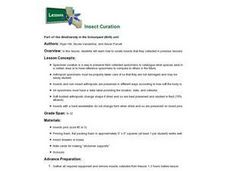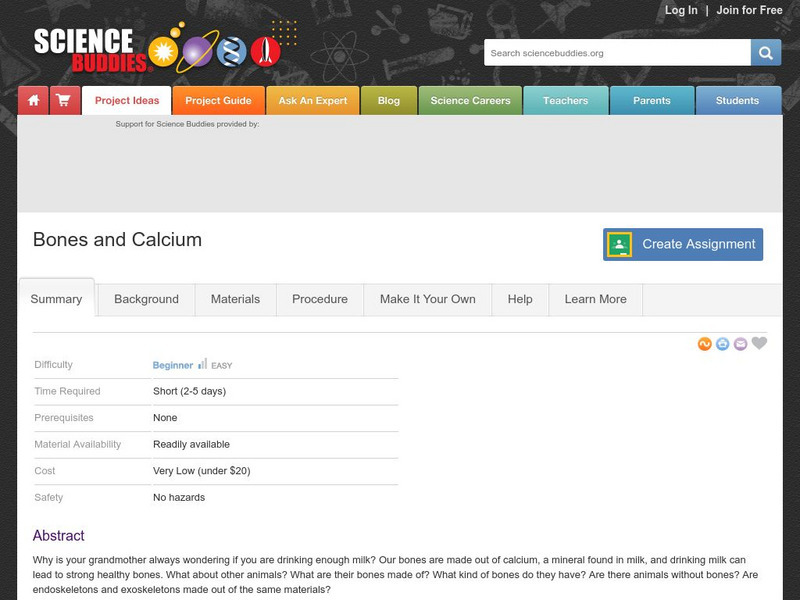Scholastic
Study Jams! Arthropods
No need to be crabby! Here is a resource that teaches your class about the characteristics of arthropods and provides stunning photos of several of them. In addition to the superb slides and their informative accompanying captions, the...
Curated OER
Invertebrate Diversity
Comparative anatomy prevails in the lesson exploring diversity among invertebrates. Biologists examine physical characteristics of an earthworm from phylum annelida and a meal worm from phylum insecta. They also inspect a cricket and a...
Curated OER
Arthropods
A set of note-taking slides introduces your biologists to the characteristics and the four subphyla of arthropods. Nothing flashy is included, but it is a tidy and straightforward presentation that you can use when your class is...
Curated OER
Exploration of "Pillbugs"
Fifth graders define vocabulary terms, identify the characteristics of a pillbug, and create a dichotomous key. Then they examine the pillbugs and make observations and record these observations. Finally, 5th graders observe specific...
Curated OER
What's the Difference?
Students analyze the similarities in different species. This lesson is part of a multi-segmented unit on the diversity of life. In this segment, students classify shoes to mimic the scientific categories of the classification system.
Curated OER
Animal Life Stages
Guide your young scientists in reviewing basic animal processes including digestion and reproduction. Students review the stages of metamorphosis and the different types of body symmetry. This worksheet has 8 matching, 6 true or false, 4...
Curated OER
Arthropods
This PowerPoint leads students through the details of the Phylum Arthropoda and the subphyla that have various distinctive characteristics. There are pictures to illustrate the individual classes and slides of information.
Curated OER
Blue Planet: Seasonal Seas
Students study and research marine invertebrates. In this marine lesson plan students create an illustrated report and help complete a class exhibit.
Curated OER
So You Think You're Tough
Fourth graders learn how to classify animals. In this invertebrates lesson plan, 4th graders discuss how we classify thinks into groups and move into a discussion about classifying animals. Students learn about the differences between...
Curated OER
Arthropod Rhymes
In this arthropods instructional activity, students read rhymes about arthropods and use the science terms they have learned to answer the question following the rhyme. This instructional activity has 12 fill in the blank questions.
Curated OER
Interesting Insects
In this insects worksheet, students read about insects and then answer the 10 questions pertaining to what they just learned. The answers are on the last page.
Curated OER
Arthropods
In this arthropods worksheet, students complete a graphic organizer by reading characteristics of the different classes or subphylum and writing in examples for each of these groups.
Curated OER
Characteristics of Arthropods
In this arthropods learning exercise, high schoolers will review arthropod exoskeletons, jointed appendages, molting, and types of respiratory structures. Students will also review arthropod senses, body systems, and reproduction. This...
Curated OER
Insect Curation
Learners explore how to curate insects that they collected in previous lessons. They are told that specimen curation is a way to preserve field collected specimens to catalogue what species exist in a certain area or to have reference...
Curated OER
Using Insects in the Classroom
Students identify and interpret the importance and diversity of the insect world. Students organize various insects into a classification system based on their characteristics. Students create tree or window ornaments utilizing their...
Curated OER
World of Insects
In this biology worksheet, students identify and locate various vocabulary terms related to the world of insects in the puzzle. There are 51 words to locate in the word search.
Curated OER
Goals of the Diversity of Life Unit
Students are introduced to the unit on the importance of diversity of life and the role that interdependence plays in our worlds. this is part of a multi-lesson unit on the diversity of life.
Curated OER
What is Diversity of Life?
Students are introduced to the variety of organisms in our world. this lesson is a part of a multi-segmented unit on specie diversity. this segment explores distribution of life on land and sea.
Curated OER
Kingdom Animalia
Students are introduced to the basic characteristics of the animal kingdom. this lesson is part of a multi-segmented unit on the diversity of life. In this segment, students explore the the members of a few phyla of the animal kingdom.
Curated OER
Tackling Taxonomy
Students study physical characteristics of separate phyla and place them into similar groups. This lesson plan is part of a multi-segmented unit on the diversity of life. students develop a classification system by grouping animals into...
Curated OER
Creative Classification
Students create an animal by using physical characteristics to classify that animal in the Linnaean Classification System. This lesson is part of a multi-segmented unit on the diversity of life.
Curated OER
Missing Links
Pupils change one animal group into another animal group by changing only a few body characteristics. This lesson is part of a multi-segmented unit on the diversity of life. In this session, students the basis of classification.
Curated OER
Diversity Debate
Students investigate the importance of dependency and diversity in a rain forest ecosystem. This instructional activity is part of a multi-segmented unit on the diversity of life.
Science Buddies
Science Buddies: Bones and Calcium
Why is your grandmother always wondering if you are drinking enough milk? Our bones are made out of calcium, a mineral found in milk, and drinking milk can lead to strong healthy bones. What about other animals? What are their bones made...

























